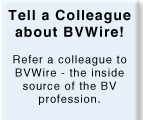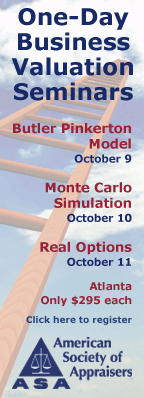
| More blame for FAS 157 in current economic crisis?
But a more moderate view, posted on Monday ’s FEI blog (September 15, 2008), suggests that the timing of FAS 157, requiring implementation of the market participants methodology for fair value measurements, “was one element that, when combined with the subprime crisis and suddenly illiquid markets, appears to have been caught up in a ‘perfect storm’ of sorts.” Even now the FASB, IASB and the SEC are working with various roundtables and other forums to gather feedback on fair value for financial reporting standards, FEI notes, as well as issues relating to securitization, consolidation and off-balance sheet entities. Colorado court considers fair value standard in divorce After 27 years of marriage, the Thornhills of Colorado divorced, negotiating a separation agreement that turned primarily on the disposition of the husband’s 70% interest in an oil and gas business. The wife later repudiated the agreement—but the trial court ratified it anyway—finding its provisions fair and equitable, and the wife appealed. The Colorado Court of Appeals ruled the agreement was unconscionable, largely because the wife lacked legal counsel during its negotiation and had limited understanding of its terms—including its lack of providing interest and security for a substantial 10-year payment by the husband. Presumably, the wife also lacked her own valuation expert, because the court only mentions the husband’s expert, who valued his interest in the company at nearly $1.7 million—after the application of a 33% discount for lack of marketability. The appellate court did not have to rule on the valuation determination, but just “because it may arise on remand,” it considered the wife’s argument that—by analogy to Colorado cases interpreting dissenting shareholder rights—marketability discounts should not apply in divorce cases, either. The court examined precedent on both sides of the issue, ultimately concluding that divorce is not analogous to shareholder dissent. The applicable marital dissolution statutes do not contain the same “fair value” language as the business corporation statutes, the court said. Moreover, to preclude a trial court from applying marketability discounts in the appropriate divorce case “could unfairly penalize a party for ownership of shares that cannot be readily sold or liquidated.” The conservative result (which the court took on its own initiative) suggests to some Colorado analysts that the panel has permitted the parties the option for further appeal to the state Supreme Court. An abstract of In re Marriage of Thornhill (Aug. 21, 2008) will appear in the October Business Valuation Update™, and a copy of the full-text court opinion is available to subscribers of BVLaw™. For a current overview of U.S. court rulings, check out “The State of the Fair Value Standard in Divorce,” by John S. Stockdale Jr., Esq., available as a Free Download at BVResources.com. Duff & Phelps use skyrockets among BV firms Over half (51%) of BV practices now rely on cost of capital data from the Duff & Phelps, LLC Risk Premium Report, according to BVR’s 2009 Business Valuation Firm Economics & Best Practices Survey. Compare this to just two years ago, when BVR’s survey reported that only 19% of responding firms relied on Duff & Phelps data. The survey permitted multiple responses regarding use of research tools, and found that Ibbotsons still tops the list, with over 86% of BV firms using the Stocks, Bonds, Bills, and Inflation® Yearbooks (now published by Morningstar). Pratt’s Stats® and BIZCOMPS® are number two and three on this year’s list, while Duff & Phelps has leapt from the bottom to the fifth most popular research tool among BV professionals. Free Duff & Phelps download. To inform the rising use of this comprehensive cost of capital research tool, we’ve just posted an excerpt from this year’s (2008) Risk Premium Report as a Free Download at BVResources.com. This includes over 30 pages of information and exhibits on historical risk premiums, size, and other critical measures. And for more on the most up-to-date financial metrics, compensation and billing rates, marketing and research benchmarks of BV firm practices—compiled from nearly 600 responding firms—be sure to check out BVR’s 2009 Business Valuation Firm Economics & Best Practices Survey. Ready, set, converge On September 11, 2008, the International Accounting Standards Board (IASB) and the Financial Accounting Standards Board (FASB) published an update to their 2006 Memorandum of Understanding (MOU) highlighting their progress on major convergence projects thus far. With the exception of intangibles (which is inactive) and financial instruments, all other major convergence projects are on track to be completed by 2011. Some projects, such as business combinations and fair value measurements, are already completed and their standards published. Both Boards again have reemphasized their commitment “to the development of high quality, compatible accounting standards that could be used for both domestic and cross-border financial reporting.” FLP/LLC success factors Creating a successful FLP or LLC as a vehicle to preserve family wealth can be a challenge, especially with the ever-changing case law. While there are plenty of ideas on what not to do when creating an FLP or LLC, Owen Fiore (FioreWealthPlanningConsulting, Kooskia, ID) has created a list of positive, proactive steps that he has aptly named his “Factors of Success.” These success factors are based upon recent and historical taxpayer defeats and victories in court. Fiore argues that the Courts start by looking at the underlying plan and advsises that, to “avoid conflicts of interest, consider the use of independent legal counsel for various family members, and, above all, develop realistic and well-supported non-tax purposes for using the FLP or LLC.” Fiore offers additional FLP/LLC success factors, as well as an overview of the most important estate and gift tax cases from the past year in BVR’s 2009 Guide to Estate and Gift Tax Case Law – For the Business Valuation Professional (available in November—preorder here.) A word of support for our Texas BV friends As a result of Hurricane Ike, many BV practices and professionals located in the storm's path have had to close or adjust operations, and they may not be back to normal for a long time. Here’s a group email we received from Will Frazier at HFBE in Dallas that reminds us all how close to home these natural disasters can strike:
Venture capital valuation committees—a thing of the past? Carl E. Kaplan (retired partner at Fulbright & Jaworski L.L.P.), offices throughout the world) has written a recent article titled Valuation Committees in Venture Capital Limited Partnerships - A Thing of the Past? Key portions observe:
The complete article can be downloaded here. |
To ensure this email is delivered to your inbox,
please add editor@bvwire.com to your e-mail address book.
We respect your online time and privacy and pledge not to abuse this medium. To unsubscribe to BVWire™ reply to this e-mail with 'REMOVE BVWire' in the subject line or click here.
Copyright © 2008 by Business Valuation Resources, LLC
BVWire™ (ISSN 1933-9364) is published weekly by Business Valuation Resources, LLC
Editorial Staff | Advertise in the BVWire | Copyright Notice
|
|


